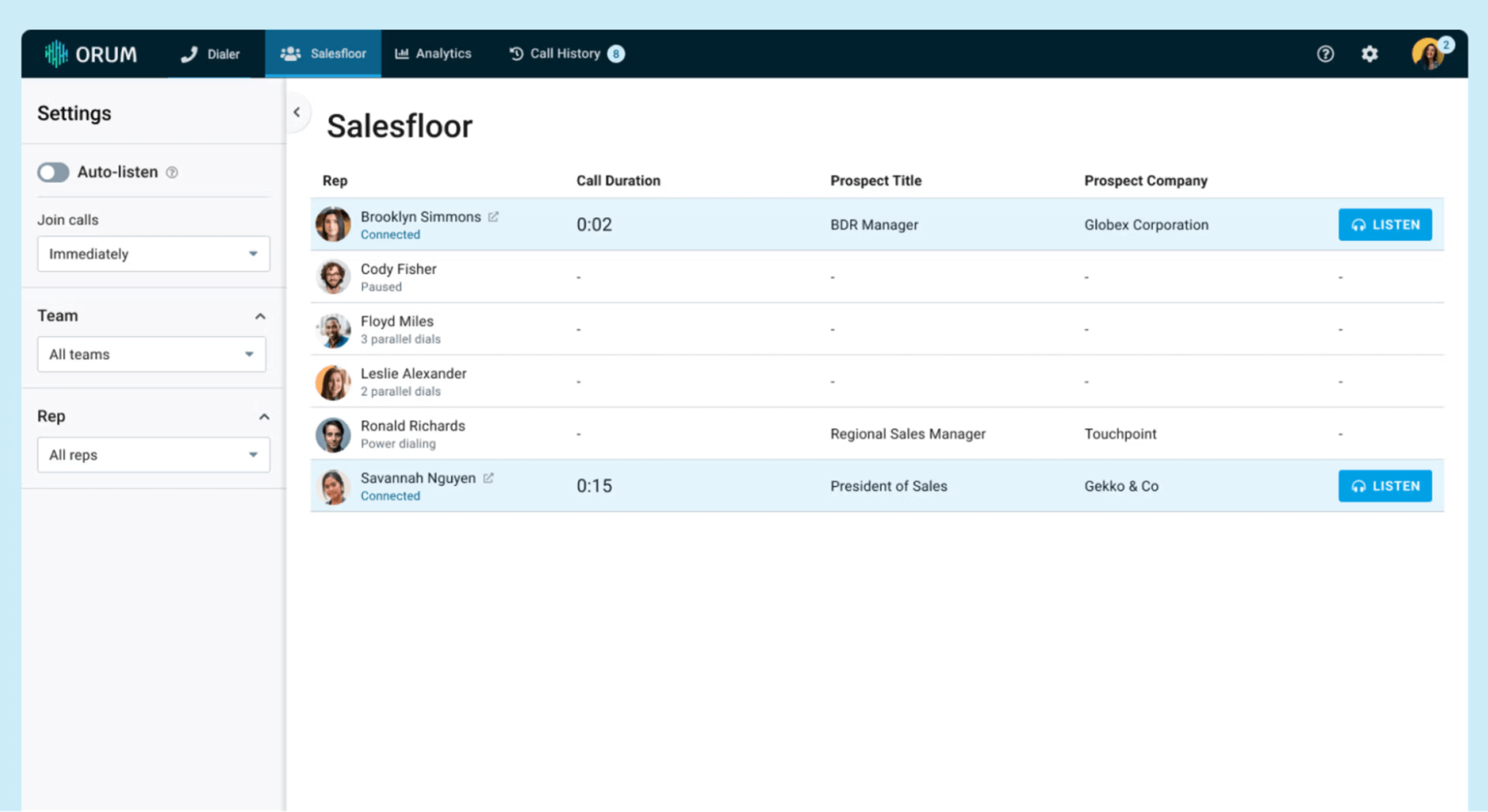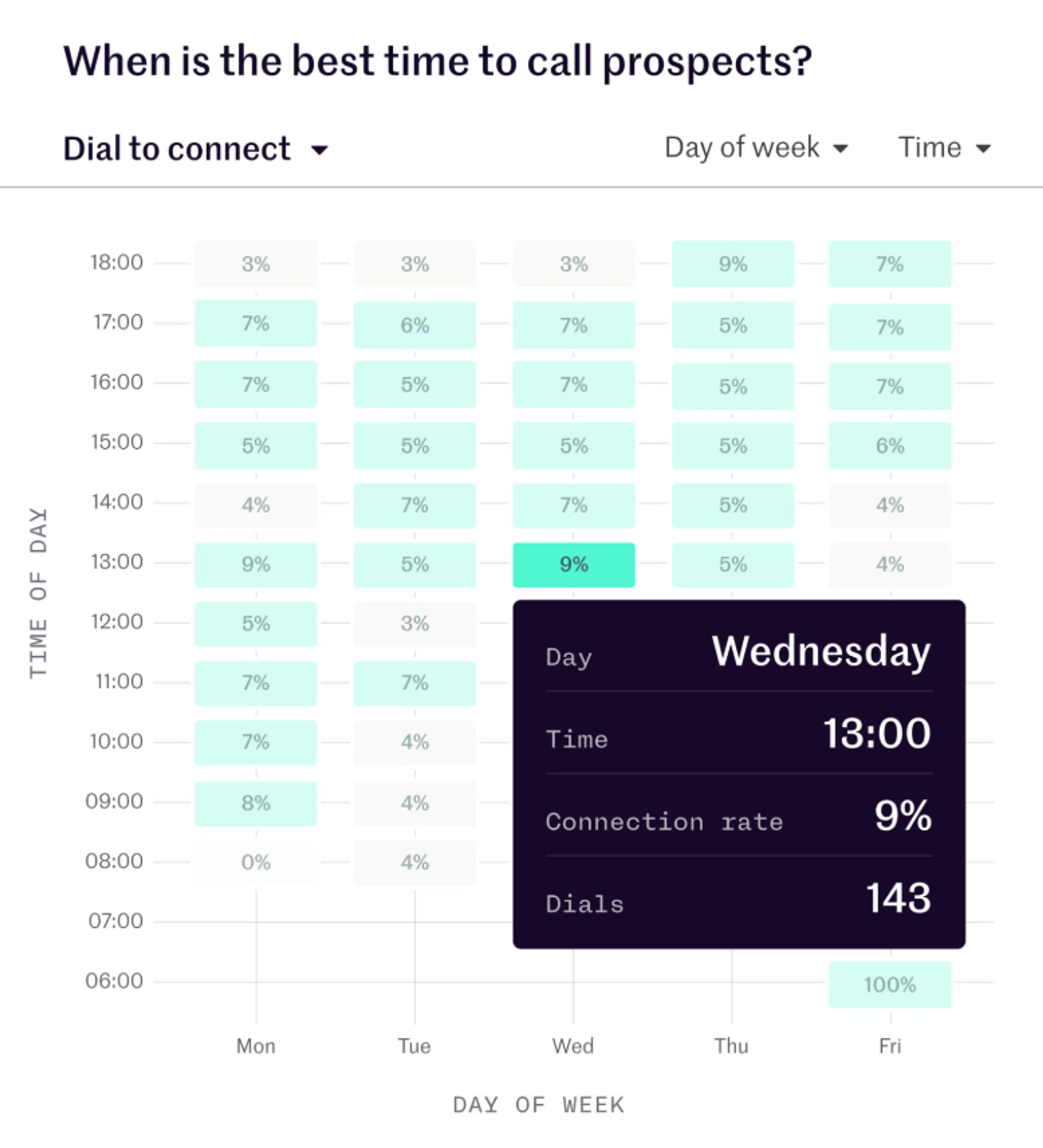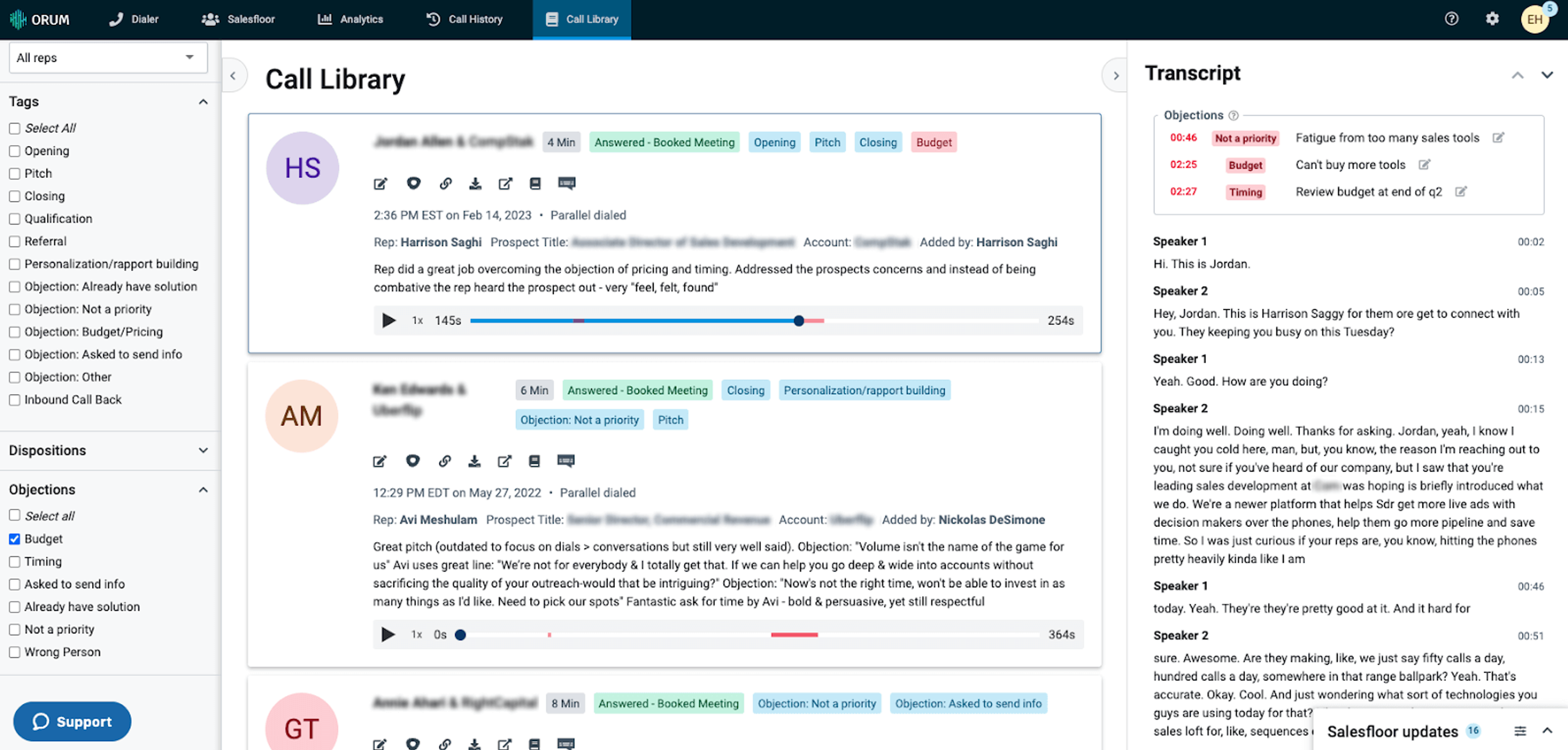Sales Development Representative: Key Principles & Strategies


Here’s the reality: Most sales development representatives don’t get the right support to succeed.
They’re handed a list, told to hit a call quota, and left to figure it out. No clear strategy. No real SDR coaching. No system to scale what works. That’s a recipe for burnout, missed targets, and wasted pipeline potential.
This guide helps you prevent that.
Whether you’re an SDR looking to sharpen your approach or a sales leader with the aim of building a stronger team, you’ll get real, actionable strategies. From better outreach tactics to smarter follow-ups and AI-powered efficiency, we’re going to share a clear path to better results.
Turn strategy into action
Orum helps you automate dialing, track real-time insights, and connect with high-intent prospects faster.
What is a sales development representative (SDR)?
A Sales Development Representative (SDR) finds and qualifies potential customers before handing them off to the sales team. Their job is to fill the pipeline with qualified leads so account executives (AEs) can focus on closing deals (instead of chasing cold prospects).
In other words, SDRs sit between marketing and sales, turning leads into real sales opportunities. Marketing attracts prospects, but SDRs qualify them through outreach before handing them off to AEs, who then focus on closing deals. Once a deal is closed, customer success takes over to ensure smooth onboarding, retention, and expansion.
| Marketing → SDRs → AEs → Closed deals → Customer Success |
|---|
Key responsibilities of an SDR in a modern sales team
An SDR’s role has evolved beyond just making cold calls. Today, their job description includes strategic prospecting, smart automation, and efficient lead qualification.
Here’s what a modern sales development representative is responsible for:
- Prospecting: Identifying and reaching out to potential customers through phone calls, emails, and social media
- Lead qualification: Determining if a prospect is a good fit based on need, budget, and decision-making power
- Cold calling and follow-ups: Building relationships, engaging leads, handling objections, and keeping conversations moving
- Booking meetings: Scheduling demos or discovery calls for account executives (AEs)
- CRM and data management: Logging activities, tracking engagement, and ensuring accurate prospect data
- Collaboration: Working with marketing to refine messaging and with AEs to improve lead handoff
To make the “SDR vs. AE” distinction even more clear, here’s a simple table showing differences in responsibilities between SDRs and account executives.
| SDR | Account executive |
|---|---|
| Generate interest | Run demos |
| Qualify prospects | Handle objections |
| Book meetings | Close deals |
Now, let’s take a closer look at how SDRs impact bottom-line growth.
How SDRs contribute to revenue growth and pipeline efficiency
SDRs are the engine of a predictable sales pipeline. Without them, account executives are likely to spend too much time talking to unqualified leads.
A strong SDR function ensures only high-potential prospects move forward, which results in:
- Shorter sales cycles: SDRs qualify leads early, so AEs spend less time on unproductive conversations and more time closing deals
- Higher conversion rates: By engaging prospects at the right time with the right message, SDRs “warm up” leads before they ever reach an AE
- More pipeline coverage: SDRs keep outreach consistent to generate pipeline (there’s a steady flow of new opportunities)
- Better resource allocation: With SDRs handling prospecting and qualification, AEs can focus on their core strength, closing high-value deals
As you can see, being an SDR isn’t just about hitting sales quotas, but also connecting with the right prospects, asking the right questions, and driving real opportunities.
So, what are the key skills one needs to be successful in an SDR role?
Essential skills every high-performing SDR needs
An SDR’s job is to create momentum in the sales process. Prospects need to stay engaged and move smoothly from interest to a meaningful sales conversation.
There are three key skills every successful SDR has:
- Active listening
- Strategic prospecting
- Objection handling
Active listening
Successful SDRs pay attention to tone, hesitation, and underlying concerns, reading between the lines to uncover what a prospect really needs. Instead of rushing into a pitch, they ask thoughtful follow-ups: What’s your biggest challenge right now? What’s missing from your current solution? When SDRs focus on understanding instead of just responding, their conversations become more valuable.
Strategic prospecting
Spraying cold emails and making random dials doesn’t build a strong pipeline. Top SDRs research before they reach out. They check for trigger events like funding rounds, hiring trends, or product launches to find prospects who are more likely to engage. Instead of using a one-size-fits-all approach, they craft outreach that feels relevant and timely.
Objection handling
Every sales development rep hears “Not interested” or “We're already using something”. An average salesperson takes that as a dead end. But the best SDRs know that objections are just resistance, not rejection.
Instead of shutting down, they dig deeper. What’s working well for you? What’s one thing you’d improve? By staying curious and reframing the conversation, they turn pushback into an opportunity to learn and keep the door open for future engagement.
💡 Pro tip
The strongest SDRs think like closers. Before passing a lead to an AE, they ask themselves: If I were responsible for closing the deal, would I take this call? If the answer is no, they change their approach. The point is to help the sales organization they’re a part of, not to tick a KPI checkbox.Mastering cold outreach: Calls, emails, and multi-channel outbound prospecting
Reaching out to a prospect who doesn’t know you is tough. Their inbox is full, their phone is constantly ringing, and they don’t have time for another generic pitch. Cutting through the noise takes strategy, persistence, and a multi-channel approach that meets prospects where they are.
When cold calling, get to the point fast
The first few seconds of a cold call decide everything. If you sound scripted or hesitant, you lose them.
Successful SDRs open with confidence and relevance: Hey [Name], I saw your company just expanded its sales team—how’s that going so far? They don’t waste time on long introductions. They make it about the prospect, not themselves, and guide the conversation naturally.
Keep cold emails short and personalized
Long emails don’t get read. The best cold emails feel like a quick, relevant message from a trusted contact.
Instead of dumping product features, they highlight a pain point, for example: I noticed you’re hiring more AEs—many sales leaders we talk to struggle with ramping them up fast. Worth a quick chat? A strong subject line, clear value, and a simple CTA make all the difference.
Meet prospects where they are
If a prospect doesn’t respond to an email, it doesn’t necessarily mean they’re not interested. Before writing them off, you should try another channel. The best SDRs combine calls, emails, LinkedIn, and video outreach to stay top of mind without being pushy.
A structured cadence could look like this:
- Day 1: Personalized email
- Day 2: Cold call + LinkedIn connection request
- Day 4: Follow-up email referencing the call
- Day 6: LinkedIn message with a relevant insight
💡 Pro tip
Watch for engagement signals. If a prospect opens your email but doesn’t reply, follow up with a phone call. If they’re active on LinkedIn, engage with their posts before messaging. Successful outreach is about taking context into account and adapting, not just following a script.SDR checklist: Strategies and daily habits to hit quota
There’s a big difference between staying busy and actually driving results. To be successful in an SDR role, you need to know exactly where to focus your time, how to structure outreach, and what habits move the needle.
This checklist will help you stay on track:
✅ Use data to prioritize high-intent prospects
✅ Personalize outreach at scale without losing efficiency
✅ Structure the workday for peak productivity
✅ Track performance metrics to identify improvement areas
✅ Learn from coaching, feedback, and sales playbooks
1. Use data to prioritize high-intent prospects
Not all leads are worth your time. High-intent prospects are already engaging with you. They’re visiting your website, opening emails, or interacting on LinkedIn, and they have an interest in your company’s product. Reaching them at the right moment makes all the difference.
- Track engagement signals: Look for website visits, email opens, and content downloads to spot prospects showing real interest.
- Score and segment leads: Identify patterns in behavior to focus on the most engaged and qualified prospects first.
- Act immediately: Follow up when intent is highest (waiting even a day can reduce your chances of a response).
- Drop cold leads faster: If a prospect isn’t engaging after multiple touchpoints, shift your focus to those who are.
Timing is everything. Orum’s AI-powered dialing and real-time insights help SDRs reach high-intent prospects at the moment they’re most engaged.
Additionally, the Salesfloor helps de-silo your sales organization. Instead, teams can compete, collaborate, exchange insights, and stay engaged. It’s far easier to pinpoint high-intent prospects when you open up communication channels inside sales.

2. Personalize outreach at scale without losing efficiency
Reaching the right prospects at the right time is critical. But doing it at scale without losing the personal touch is where most sales team members struggle.
The key is leveraging automation while keeping personalization meaningful, here’s how:
- Use CRM integrations to pull in prospect insights automatically (e.g. job title, company news, past interactions, engagement history)
- Segment leads based on behavior and priority (high-intent prospects get deeper personalization, while lower-intent leads follow automated sequences)
- Personalize the first few lines, not the entire message (e.g. you can reference a company update, shared connection, or specific challenge to grab attention)
- Automate repetitive tasks (you can use automated dialers, email sequences, and follow-up reminders to stay consistent)
To make personalization easier for you, Orum developed an AI-powered dialer to help you connect with more prospects in less time.

3. Structure the workday for peak productivity
With a packed calendar, constant follow-ups, and an ever-growing list of prospects, time management can mean the difference between hitting quota and burning out. Here’s how sales executives stay efficient and focused with time blocking.
When you schedule your day in blocks, you’re intentionally prioritizing what drives results. Instead of bouncing between tasks. It’s smart to dedicate focused time for calls, research, follow-ups, and admin work. A simple structure might look like:
| 8:00-9:00 AM | Review the CRM, plan the day, research top new leads |
|---|---|
| 9:00-11:00 AM | Power hour for outbound calls |
| 11:00-12:00 PM | Personalized email outreach and LinkedIn engagement |
| Break & reset |
|---|
| 1:00-3:00 PM | More calls + follow-ups from earlier outreach |
|---|---|
| 3:00-4:00 PM | CRM updates, reporting, and strategy review |
Additionally, with Orum, you can leverage call data to uncover the best times during the week to call prospects, and make sure that you’re optimizing dialing time.

4. Track performance metrics to identify improvement areas
You can’t fix what you don’t measure. Tracking the right sales metrics helps SDRs and managers spot bottlenecks, refine outreach, and scale what’s working. But drowning in data won’t help. You need to focus on the right numbers.
Here are some key metrics to keep in mind:
- Call connection rates: Are reps reaching enough real prospects, or wasting time on bad numbers?
- Response rates: Which emails, LinkedIn messages, or call scripts are getting engagement?
- Meeting conversion rates: How many booked meetings turn into real pipeline?
- Time-to-first-contact: Are inbound leads being followed up with quickly, or going cold?
- Objection trends: What’s stopping prospects from moving forward, and how can messaging improve?
Orum’s real-time analytics track call performance, response patterns, and conversion trends. This gives sales managers instant visibility into what’s working and where to improve.

5. Learn from coaching, feedback, and sales playbooks
Coachability is what separates average SDRs from top performers. The best SDR teams have a strong culture of refining their approach with every conversation. Here’s how to level up faster:
- Use real-time coaching: Sales call coaching is all about getting instant feedback, which helps sales roles adjust on the spot
- Review top-performing calls: Learning from what works, whether it’s handling objections or perfecting the opener, shortens the learning curve
- Follow a structured playbook: Consistency wins, so it makes sense to stick to a well-defined sales process and replicate success (of course, playbooks need to be updated continuously)
💡 Pro tip
Looking for a way to support sales team members ramp up faster? Give them an opportunity to shadow live calls, review top-performing talk tracks, and get real-time coaching on objections.
Instead of memorizing scripts, they should focus on pattern recognition. This includes spotting common pushbacks, knowing when to push forward, and adapting based on real prospect responses.
Building a team that delivers
If there are two key takeaways we want you to take from this guide, it's these:
1) data should guide every decision and
2) execution matters as much as strategy.
You need to track engagement signals to focus on high-intent prospects. Likewise, you have to measure response rates, call connections, and meeting conversions to refine your outreach. Using real-time insights will help you adjust strategy, not just at the end of the quarter, but every single day.
In the end, having a plan is one thing, but making it work is another. Every touchpoint should have a purpose, every call should add value, and every follow-up should move the deal forward.
The best salespeople apply feedback fast, learn from top-performing calls, and follow structured outreach cadences. Track what works, improve what doesn’t, and go make it happen.
Turn strategy into action
Orum helps you automate dialing, track real-time insights, and connect with high-intent prospects faster.





